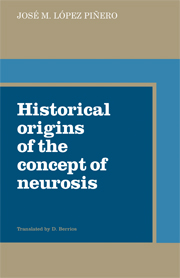2 - The concept of neurosis in German romantic medicine
Published online by Cambridge University Press: 06 August 2010
Summary
Germany's odd position in European medicine during the early part of the nineteenth century stems partially from her support of romantic speculative medicine, or so-called Naturphilosophie, in a period during which other countries (e.g. Austria and Britain) had already adopted the anatomoclinical view initiated by the Paris school.
Therefore, before exploring the impact of the anatomoclinical view, an account will be given of the way in which the concept of neurosis was influenced by speculative pathology and by its rival doctrines. One of these was eclecticism and the other a collection of views that, after 1830, marked the transition from Naturphilosophie to the anatomopathological view.
Absence of the concept of neurosis in the work of the followers of ‘Naturphilosophie’
Naturphilosophie refers to a complex speculative movement that developed in Germany during the romantic period out of the idealist philosophy of Schelling; associated mainly with the southern German Universities, its sponsors produced numerous publications during the first three decades of the nineteenth century.
How important is Naturphilosophie to the historical study of the concept of neurosis? It could be speculated that the tendency amongst the romantics to ‘personalize’ nature – that led writers such as Ringseis to postulate a link between disease and sin – might also have affected the evolution of the neurosis, for example by suggesting a sui generis and personalized formulation of the concept. The search for historical precedence however is always a bad historiographic technique.
- Type
- Chapter
- Information
- Historical Origins of the Concept of Neurosis , pp. 25 - 43Publisher: Cambridge University PressPrint publication year: 1983



